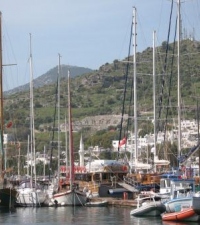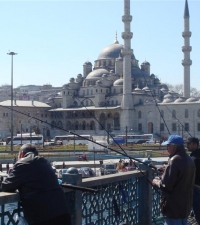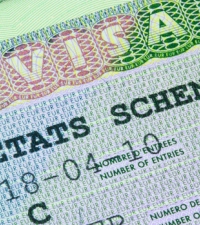Entry Requirements and Visas in Turkey

Turkey is a land for all seasons, whether you fancy dipping your toes in the warm Aegean, tumbling over ancient stones as old as time itself, hiking past towering peaks, shooting the rapids or gazing up in awe at the dome of Aya Sofia. There’s something for everyone – for the cultured, the curious, the adventurous and the lazy. Increasingly, Turkey is also the destination of choice for work and stay as well as play. Here’s how:
Getting In: Tourist visas
Depending on your nationality, you may or may not need a visa to enter Turkey. For example, citizens of the UK and USA do need an entry visa but citizens of Malaysia and Denmark don’t. Some tourist visas allow multiple entry within a given period, some don’t. If in doubt, check with the Turkish Embassy in your own country or refer to the current list at:
http://www.mfa.gov.tr/ or http://www.turkishconsulate.org.uk/
Most tourist visas can be obtained at the point of entry to Turkey and are valid from between 15 and 90 days, but make sure you understand the conditions attached to your particular visa. The cost of a tourist visa varies from country to country. For the latest official prices from the Turkish Government, check: http://www.mfa.gov.tr/
Staying Longer: becoming a Resident or Working in Turkey
If you plan to remain in Turkey for a longer period, you have several choices. Most people who intend to settle opt for a residence visa (Ikamet) or, if they are eligible, a work visa. If you’re working as a tour rep, you can obtain a specific visa to cover your time in Turkey. For a full list of specialist visas, refer to the Turkish Embassy in your own country. Whichever visa you apply for, it’s essential that you get one before your tourist visa expires.
Residence Visa (sometimes referred to as a Residence Permit)
Residency visas in Turkey generally last for between 6 months and 5 years. Costs vary depending on your nationality but in most cases there are two basic fees: the cost of becoming a resident and the cost of the actual permit itself (usually a small blue booklet).
There was a time when getting hold of a Turkish residence permit could take months, involving multiple visits to various offices to get various official stamps on various bits of paper. Stamps are big in Turkey. These days, the application process can be completed in one or two days and the permits issued 2 or 3 weeks later. Unless you have a good grasp of Turkish, it can be a bruising experience, but with the right preparation, a fixed smile, a fair degree of determination and patience, lots of it, you should be okay. If you’re unsure, contact one of the many English speaking locals – there is a growing band of helpful experts who, for a fee, will guide you through the bewildering maze. It’s worth the money to make the whole process much less painful.
The actual application process will vary from town to town, but will generally involve each of the following steps:
- Armed with your passport, a batch of passport photos and evidence of your residence (photocopy of a rental agreement or proof of a property owned in Turkey - your Tapu ) take a trip to your local Mayor’s office (Muhtar in Turkish). The Muhtar will take a couple of your passport photos, various photocopies and will stamp everything in sight, eventually issuing a confirmation of your registration. You may incur a small cash fee for this service.
- Next stop, the Passport Police (bring your passport to gain entry). Tell them you want to apply for a residence permit (ikamet) and they will issue the relevant forms, including the actual application form.
- Then it’s time to part with cash. Go to the local municipal finance office (Maliye), present your passport, tax number (see below) and the forms issued by the Passport Police. They will usually issue a slip of paper which you must take to a separate payment section to pay for your residence visa. Make sure you get and keep evidence of payment.
- Complete the residence visa application form you were given by the Passport Police. The form is in Turkish and English.
- Next, pop back to the Passport Police, gathering everything together and popping it into a file (some towns insist you use a specifically designed ikamet folder available at local stationers). The folder should contain your completed application form, passport photos, a photocopy of a bank statement/bank book showing your capital or evidence of income, a photocopy of your rental agreement/Tapu, a photocopy of the Muhtar form and two photocopies of the first page and last entry stamp from your passport. Assuming a fair wind, a kindly officer and a complete file, you will be given an approximate time for your application to be processed. 2-3 weeks seems to be the standard waiting time, but this will vary from location to location. Keep checking with them. You will need to collect the permits from the Passport Police when they are ready – they won’t post them out and they won’t tell you when they are ready.
Getting a Work Visa
It is notoriously difficult to obtain a work visa in Turkey if you are a foreign national. The Turkish Government has placed restrictions on types of work which cannot be carried out by foreigners. See the ‘Occupations Banned to Foreigners’ in the following ink: http://www.turkishconsulate.org.uk/en/work_visa.asp
If you think you are eligible, you will need a letter of employment or contract from a prospective employer. Unless you already have a Turkish residence visa, you should present the employer’s letter/contract, along with an application form and supporting documents to the Turkish Consulate or Embassy in your own country. At the same time, your employer must submit an application in Turkey by submitting a file to the Ministry of Labour and Social Security, Department for Work Permits for Foreigners. There should not be more than 3 working days between the employee's and the employer's applications. A summary of the process and information required for work visa applications has been produced by the Turkish Government: https://www.invest.gov.tr/en/InvestmentGuide/
Expect your application to take around 2 months to be processed. Once you get the all clear, you and your passport will be asked to visit your consulate to get the all-important work visa stamp.
Note: Working illegally, without the correct visa and work permit, could result in deportation from Turkey, a fine and a ban on re-entering. You may be held in a detention centre awaiting deportation and are unlikely to be able to collect your belongings before they throw you out. Don’t risk it. Always make sure you have a valid visa.
Other Types of Visa
Study Visa
Applications to study in Turkey should be made through the Turkish Embassy or Consulate in your own country. You will need to supply a completed application form, a passport photograph, an acceptance letter from the Turkish university or school certified by the Ministry of Education, and depending on your circumstances, a valid residence permit and/or confirmation from a home university or school for exchange students.
Journalist Visa
You will need to supply an invitation letter from Turkey, confirmation from your home country employer that you are who you say you are and the purpose of your visit(s), a completed application form and a passport valid for at least 6 months
Transit Visa
If travelling by air, you won’t need a visa as long as you are passing through the country immediately. You can’t leave the airport under these circumstances and you must hold a ticket to a destination out of Turkey. If travelling by sea or land you will need a visa. The application process is the same as that of applying for a tourist visa.
For all other types of visa, it’s best to seek advice from your Turkish Embassy or Consulate: http://www.mfa.gov.tr/turkish-representations.en.mfa
The Turkish Consulate in the UK has one of the most comprehensive guides to all types of Turkish visas: http://www.turkishconsulate.org.uk/en/visa.asp#0
By Jack Scott, author of Perking the Pansies, Jack and Liam move to Turkey, a bitter-sweet tragi-comedy recalling the first year of a gay couple in a Muslim land.
- My Life Abroad -
A selection of expat stories

"A fun compulsive read!"
J. Matcham, Amazon
"I strongly advise people ready to live abroad to read this book!"
Patrice, Amazon

 Duty-Free, Customs and Foreign Cars in Turkey
Duty-Free, Customs and Foreign Cars in Turkey  What is a Schengen Visa?
What is a Schengen Visa?
 AGS Worldwide Movers
AGS Worldwide Movers Fexco payment solutions
Fexco payment solutions 1stMove Car Shipping
1stMove Car Shipping Highlights of Istanbul
Highlights of Istanbul